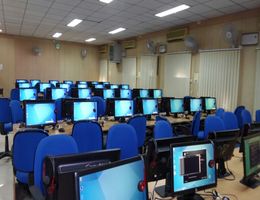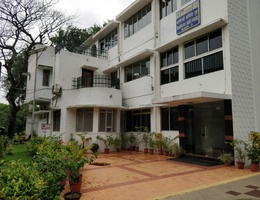Overview
Publications
Recruitment
Intranet
ICAR-Central Inland Fisheries Research Institute (ICAR-CIFRI) is a premier research institute which is dedicated towards research on sustainable management of inland open water resources, aquatic ecosystems and, also livelihood security of fishermen community through awareness, training, education and extension activities. Since ages the Institute has worked on several aspects of Hilsa which is not only a Bengali delicacy, but also carries significant socio-cultural and emotional values for the state of West Bengal. A significant portion of the fishermen community are dependent on Hilsa fishery in the state. But due to several reasons availability of Hilsa has been decreasing day by day raising concern of the researchers and policy makers for Hilsa conservation. Realizing the need for a multi-stakeholder discussion forum on this topic, ICAR-CIFRI arranged a one day long brainstorming session on “Social Implication and Fisheries of Ganga River Basin with special reference to Hilsa”. Apart from the experts working in this area, a number of fishermen and representatives of Fishermen’s Organizations from Kakdwip, Digha and Godakhali participated in the programme. The programme was divided into two sessions. In the outset of the inaugural session, Dr. B. K. Das, Director, ICAR-CIFRI welcomed the dignitaries and participants and briefed about the purpose of the brainstorming session and requested everyone to engage in active dialogue. Prof. B. N. Pandey, Working President, ZSI; Former Prof & Head (Zoology) & Dean Faculty of Science, Magadh University, Bodhgaya discussed about special pockets for river ranching where water is available throughout the season, present status of Kalbasu, Mrigal and Jayanti rohu in river ganga and present position of fish fauna in the river. Prof. P. N. Pandey, President, ZSI & Former Prof. of Zoology, Ranchi University, Ranchi emphasised on policy interventions and indigenous impact assessment on Hilsa conservation in his remarks. Professor Amalesh Choudhury, Former Prof. of Zoology, Calcutta University elaborated the history of Hilsa in Hooghly estuary and other parts of the country including its migratory and breeding patterns. He also spoke on the changes in fishing methodology, fish population, fishermen’s livelihood, and economics. Dr. Dilip Kumar, Aquaculture, Fisheries and Rural Development Adviser, Govt. of India & Former Director, ICAR-CIFE, Mumbai while addressing the audience, emphasized on artificial breeding and culture of Hilsa, and role of policymakers in implementing conservation measures. The interactive session started with detailed presentation of Dr. B. K. Das, Director, ICAR-CIFRI on achievements of CIFRI-NMCG project with special reference to Hilsa. He spoke on hilsa ranching programmes on Farakka Barrage, discussed need for research on domestication and breeding of Hilsa, statistics of hilsa catch in farakka barrage, heavy metal concentration in ganga river form lower to estuarine stretch, new fish species recorded, socio-economics of fishermen, awareness generation on overfishing and ban period. At last he declared that the Institute will be dedicated for research and developmental activities on Hilsa fir the month of May. This was followed by a panel discussion in which eminent experts, such as Dr. D. K. De, Former Pr. Scientist, ICAR-CIFRI, Dr. B. C. Jha, Former Head of Division, ICAR-CIFRI, Prof. Asim Nath, Professor, Sidho-Kanho-Birsha University, Purulia, Dr. D. N. Chattopadhyay, Principal Scientist, Rahara Centre, ICAR-CIFA, Dr. G. H. Pailan, In-Charge, Kolkata Centre, ICAR-CIFE, Dr. V. R. Suresh, Head REF Division, Dr. B. P. Mohanty, Head FREM Division, Dr. U. K. Sarkar, Head RWF Division, ICAR-CIFRI and other scientists of ICAR-CIFRI were present. Mr. Shyam Sundar Das from FFTA, Digha, Mr. Satinath Patra & Mr. Subhas Sarkar, Kakdwip, Mr. Purno Patra from Godakhali and other Hilsa fishers were also present and represented fishermen’s perception on Hilsa conservation. They highlighted several issues like siltation, industrial and agricultural pollution, extension of ban period, need for stricter legislation, coordination for policy implementation and collective approach of fishermen for their empowerment and bottom up approach f problem-solution. Prof Asim Nath, Dr. D. N. Chattopadhyay and Dr. G. H. Pailan emphasized on mesh size regulation, fish seed waste regulation, and peak breeding season of Hilsa respectively. Dr. V. R. Suresh, Dr. B. P. Mohanty and Dr. U. K. Sarkar stressed on future strategies for conservation, nutritional value of Hilsa from Hooghly river, and need infrastructural development for conservation respectively. Dr. Dilip Kumar summarized the session by highlighting on multi-stakeholder implementation of conservation programmes, commercial viability of ranching, upscaling of research findings, nutritional value of Hilsa, common platform for decision making and transforming scientific information into Commercially viable technology. At last, Dr. A. K. Saxena, Former General President, Indian Science Congress Association & Former Dean, CSJM University, Kanpur appreciated the attempt of ICAR-CIFRI for creating a multi-stakeholder platform for discussion and congratulated the director for successful conduction of the programme. The session ended with formal vote of thanks presented by Dr. R. K. Manna, Principal Scientist and Organizing secretary of the Brainstorming session. The session was smoothly compared and conducted by Dr. Aparna Roy, Scientist, Extension and Training Cell, ICAR-CIFRI.












